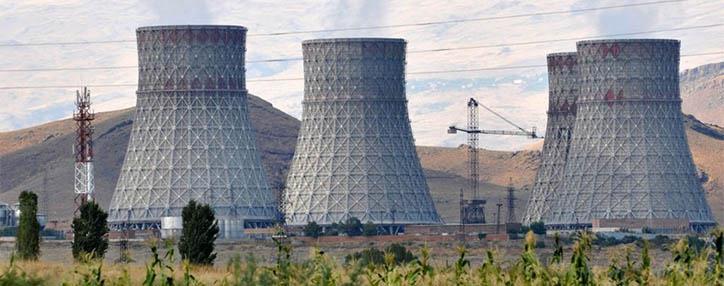Armenia is pleased with cooperation with IAEA
28.09.2016,
15:36
Yerevan is pleased with the cooperation with the International Atomic Energy Agency (IAEA), Armenia’s newly appointed minister of energy and natural resources Ashot Manukyan said Tuesday at the 60th General Conference of the IAEA in Vienna, Austria.

YEREVAN, September 28. /ARKA/. Yerevan is pleased with the cooperation with the International Atomic Energy Agency (IAEA), Armenia’s newly appointed minister of energy and natural resources Ashot Manukyan said Tuesday at the 60th General Conference of the IAEA in Vienna, Austria.
Underscoring the important role of the IAEA in the peaceful use of nuclear energy, the Armenian minister expressed satisfaction with the long-term and effective cooperation with the IAEA, , in particular, with assistance provided by the international agency to Armenia in raising the level of security of the Armenian NPP.
In Vienna the Armenian delegation had a series of meeting with the delegation of the Russian Federation, representatives of Euratom and the US Department of Energy.
During the meeting the sides discussed issues of further cooperation, as well as problems in the area of nuclear energy development and security. The week-long event which started Monday gathered representatives from 168 nations.
The Armenian Nuclear Power Plant is located some 30 kilometers west of Yerevan. It was built in the 1970s but was closed following a devastating earthquake in 1988. One of its two VVER 440-V230 light-water reactors was reactivated in 1995.
Armenian authorities said they will build a new nuclear power plant to replace the aging facility. The new plant is supposed to operate at twice the capacity of the Soviet-constructed facility. The plant currently generates some 35 percent of Armenia's electricity.
In March 2014, Armenian government decided to extend the plant’s service life because of delay in building a new unit. The service life extension has become possible due to a $270 million Russian loan and $30 million grant. --0----
Underscoring the important role of the IAEA in the peaceful use of nuclear energy, the Armenian minister expressed satisfaction with the long-term and effective cooperation with the IAEA, , in particular, with assistance provided by the international agency to Armenia in raising the level of security of the Armenian NPP.
In Vienna the Armenian delegation had a series of meeting with the delegation of the Russian Federation, representatives of Euratom and the US Department of Energy.
During the meeting the sides discussed issues of further cooperation, as well as problems in the area of nuclear energy development and security. The week-long event which started Monday gathered representatives from 168 nations.
The Armenian Nuclear Power Plant is located some 30 kilometers west of Yerevan. It was built in the 1970s but was closed following a devastating earthquake in 1988. One of its two VVER 440-V230 light-water reactors was reactivated in 1995.
Armenian authorities said they will build a new nuclear power plant to replace the aging facility. The new plant is supposed to operate at twice the capacity of the Soviet-constructed facility. The plant currently generates some 35 percent of Armenia's electricity.
In March 2014, Armenian government decided to extend the plant’s service life because of delay in building a new unit. The service life extension has become possible due to a $270 million Russian loan and $30 million grant. --0----



